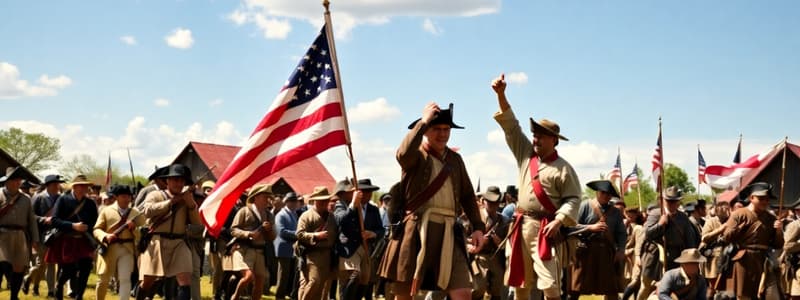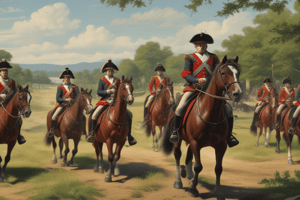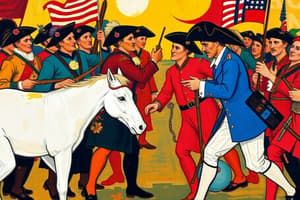Podcast
Questions and Answers
What role did the committees play for small farmers, city artisans, and propertyless laborers?
What role did the committees play for small farmers, city artisans, and propertyless laborers?
- They focused on agricultural development strategies.
- They allowed discussion of political issues and exercise of political power. (correct)
- They served as platforms for military training.
- They were primarily for social gatherings and entertainment.
Which pamphlet titles reflected the growing sentiment for liberty in the colonies by 1775?
Which pamphlet titles reflected the growing sentiment for liberty in the colonies by 1775?
- A Chariot of Liberty and Oration on the Beauties of Liberty (correct)
- Common Sense and Rights of the Colonies
- A Call to Arms and Liberty for All
- The Rights of Man and The Spirit of Liberty
How did German settlers' views on 'the famous English liberty' change by 1775?
How did German settlers' views on 'the famous English liberty' change by 1775?
- They embraced it and claimed all rights of natural-born subjects. (correct)
- They continued to oppose it firmly.
- They sought to establish a completely independent system.
- They believed it was fundamentally flawed.
What concepts did Americans increasingly invoke as the crisis deepened?
What concepts did Americans increasingly invoke as the crisis deepened?
What did John Locke's theory provide for the colonists?
What did John Locke's theory provide for the colonists?
In A Summary View of the Rights of British America, what unalienable rights did Thomas Jefferson declare?
In A Summary View of the Rights of British America, what unalienable rights did Thomas Jefferson declare?
What principle did Jefferson argue regarding government power?
What principle did Jefferson argue regarding government power?
What significant event occurred by the time the Second Continental Congress convened in May 1775?
What significant event occurred by the time the Second Continental Congress convened in May 1775?
What event initiated the conflict that led to the War of Independence?
What event initiated the conflict that led to the War of Independence?
Who was appointed as the commander of the Continental Army?
Who was appointed as the commander of the Continental Army?
What did Ralph Waldo Emerson refer to as 'the shot heard round the world'?
What did Ralph Waldo Emerson refer to as 'the shot heard round the world'?
What was one reason some colonists hesitated to call for independence?
What was one reason some colonists hesitated to call for independence?
What was a consequence of Dunmore's proclamation in November 1775?
What was a consequence of Dunmore's proclamation in November 1775?
Which group within the colonies was more likely to support a break from Britain?
Which group within the colonies was more likely to support a break from Britain?
Joseph Galloway expressed concern that declaring independence would lead to what outcomes?
Joseph Galloway expressed concern that declaring independence would lead to what outcomes?
What role did the Second Continental Congress play during the early Revolutionary period?
What role did the Second Continental Congress play during the early Revolutionary period?
What was the primary focus of Thomas Paine's Common Sense?
What was the primary focus of Thomas Paine's Common Sense?
What did Paine believe would limit America's potential within the British Empire?
What did Paine believe would limit America's potential within the British Empire?
How did Samuel Seabury perceive the actions of the Continental Congress?
How did Samuel Seabury perceive the actions of the Continental Congress?
What was a significant outcome of the actions taken by the Continental Congress on July 2, 1776?
What was a significant outcome of the actions taken by the Continental Congress on July 2, 1776?
What did Paine argue was more valuable than a monarchy?
What did Paine argue was more valuable than a monarchy?
What did Seabury refer to as 'foreign power' influencing American affairs?
What did Seabury refer to as 'foreign power' influencing American affairs?
What did Paine believe America could achieve by declaring independence?
What did Paine believe America could achieve by declaring independence?
In the context of Common Sense, which term best describes Paine's view of the existing English government?
In the context of Common Sense, which term best describes Paine's view of the existing English government?
What was one of the primary reasons the East India Company faced financial difficulties?
What was one of the primary reasons the East India Company faced financial difficulties?
How did the British government attempt to support the East India Company after its financial troubles?
How did the British government attempt to support the East India Company after its financial troubles?
What was the main purpose of the Boston Tea Party?
What was the main purpose of the Boston Tea Party?
What was a direct consequence of the Boston Tea Party?
What was a direct consequence of the Boston Tea Party?
What did the Intolerable Acts define as a major change in governance for Massachusetts?
What did the Intolerable Acts define as a major change in governance for Massachusetts?
What was the reaction of the colonists to the Intolerable Acts?
What was the reaction of the colonists to the Intolerable Acts?
What did the Quebec Act achieve in relation to the Roman Catholic Church?
What did the Quebec Act achieve in relation to the Roman Catholic Church?
What was one of the implications of the British government's taxation policies in the colonies?
What was one of the implications of the British government's taxation policies in the colonies?
What was a significant consequence for Native nations following the Revolution?
What was a significant consequence for Native nations following the Revolution?
Which city did the British occupy in December 1778?
Which city did the British occupy in December 1778?
What strategy did Nathanael Greene employ during his campaign?
What strategy did Nathanael Greene employ during his campaign?
Who led the combined American and French forces that surrounded Cornwallis at Yorktown?
Who led the combined American and French forces that surrounded Cornwallis at Yorktown?
What did the Treaty of Paris achieve for the American delegation?
What did the Treaty of Paris achieve for the American delegation?
What did British negotiators demand concerning loyalists in the Treaty of Paris?
What did British negotiators demand concerning loyalists in the Treaty of Paris?
What geographical advantage did the French fleet provide during the siege of Yorktown?
What geographical advantage did the French fleet provide during the siege of Yorktown?
What significant political body met for the first time in 1774 to address British policies?
What significant political body met for the first time in 1774 to address British policies?
What document was adopted by the Second Continental Congress on July 4, 1776?
What document was adopted by the Second Continental Congress on July 4, 1776?
What significant event occurred on April 19, 1775, marking the beginning of the Revolutionary War?
What significant event occurred on April 19, 1775, marking the beginning of the Revolutionary War?
Who commanded the Continental Army authorized by the Continental Congress in 1775?
Who commanded the Continental Army authorized by the Continental Congress in 1775?
What was the result of the Battle of Saratoga on October 17, 1777?
What was the result of the Battle of Saratoga on October 17, 1777?
What was the main idea of Thomas Paine's pamphlet 'Common Sense'?
What was the main idea of Thomas Paine's pamphlet 'Common Sense'?
What was the significance of Lord Dunmore's Proclamation issued in November 1775?
What was the significance of Lord Dunmore's Proclamation issued in November 1775?
In what year did the Second Continental Congress convene?
In what year did the Second Continental Congress convene?
What term did Thomas Paine use to describe future generations in his writings?
What term did Thomas Paine use to describe future generations in his writings?
Flashcards
East India Company
East India Company
A powerful trading company that held a monopoly over British possessions in India. It also played a key role in the tea trade with North America.
Speculative Bubble
Speculative Bubble
A situation where the price of a stock or asset rises rapidly above its actual value, driven by speculation and excitement, making it vulnerable to a sudden crash.
Boston Tea Party
Boston Tea Party
The dumping of 300 chests of tea into Boston Harbor by colonists disguised as Native Americans in protest against British taxation policies. This event sparked further tension between Britain and the colonies.
Intolerable Acts
Intolerable Acts
Signup and view all the flashcards
Coercive Acts
Coercive Acts
Signup and view all the flashcards
Quebec Act
Quebec Act
Signup and view all the flashcards
Lord North
Lord North
Signup and view all the flashcards
No taxation without representation
No taxation without representation
Signup and view all the flashcards
Why were the Battles of Lexington and Concord significant?
Why were the Battles of Lexington and Concord significant?
Signup and view all the flashcards
Why was George Washington chosen as commander?
Why was George Washington chosen as commander?
Signup and view all the flashcards
What was the Continental Army?
What was the Continental Army?
Signup and view all the flashcards
What measures did the Continental Congress take to fund the Continental Army?
What measures did the Continental Congress take to fund the Continental Army?
Signup and view all the flashcards
What was Dunmore's Proclamation?
What was Dunmore's Proclamation?
Signup and view all the flashcards
Why were many colonists hesitant about independence?
Why were many colonists hesitant about independence?
Signup and view all the flashcards
What was Joseph Galloway's view on independence?
What was Joseph Galloway's view on independence?
Signup and view all the flashcards
What impact did the declaration of independence have on colonists?
What impact did the declaration of independence have on colonists?
Signup and view all the flashcards
Committees as Training Grounds
Committees as Training Grounds
Signup and view all the flashcards
The 'Sweets of Liberty'
The 'Sweets of Liberty'
Signup and view all the flashcards
Liberty as a Symbol of Resistance
Liberty as a Symbol of Resistance
Signup and view all the flashcards
Appeal to English Rights
Appeal to English Rights
Signup and view all the flashcards
John Locke's Natural Rights Theory
John Locke's Natural Rights Theory
Signup and view all the flashcards
Government by Consent
Government by Consent
Signup and view all the flashcards
The Right to Revolution
The Right to Revolution
Signup and view all the flashcards
The Second Continental Congress
The Second Continental Congress
Signup and view all the flashcards
What was Common Sense?
What was Common Sense?
Signup and view all the flashcards
What did Thomas Paine argue about America's prospects?
What did Thomas Paine argue about America's prospects?
Signup and view all the flashcards
Who was Samuel Seabury?
Who was Samuel Seabury?
Signup and view all the flashcards
How did Seabury view the colonists' actions?
How did Seabury view the colonists' actions?
Signup and view all the flashcards
What is the Declaration of Independence?
What is the Declaration of Independence?
Signup and view all the flashcards
Who wrote the Declaration of Independence?
Who wrote the Declaration of Independence?
Signup and view all the flashcards
What was the Continental Congress?
What was the Continental Congress?
Signup and view all the flashcards
What role did the Continental Congress play?
What role did the Continental Congress play?
Signup and view all the flashcards
British Strategy in the South
British Strategy in the South
Signup and view all the flashcards
Battle of Yorktown
Battle of Yorktown
Signup and view all the flashcards
Treaty of Paris (1783)
Treaty of Paris (1783)
Signup and view all the flashcards
Impact of the Revolution on Native Nations
Impact of the Revolution on Native Nations
Signup and view all the flashcards
Declaration of Independence
Declaration of Independence
Signup and view all the flashcards
Battle of Cowpens
Battle of Cowpens
Signup and view all the flashcards
Greene's Campaign of Strategic Retreats
Greene's Campaign of Strategic Retreats
Signup and view all the flashcards
Battle of Guilford Courthouse
Battle of Guilford Courthouse
Signup and view all the flashcards
Battles of Lexington and Concord
Battles of Lexington and Concord
Signup and view all the flashcards
Battle of Bunker Hill
Battle of Bunker Hill
Signup and view all the flashcards
Continental Army
Continental Army
Signup and view all the flashcards
Lord Dunmore’s Proclamation
Lord Dunmore’s Proclamation
Signup and view all the flashcards
Common Sense
Common Sense
Signup and view all the flashcards
Battle of Saratoga
Battle of Saratoga
Signup and view all the flashcards
Joseph Brant
Joseph Brant
Signup and view all the flashcards
Study Notes
The American Revolution: A Crisis of Empire
- The British empire's global events powerfully impacted the American colonies.
- The East India Company, a powerful trading monopoly, faced financial difficulties.
- The British government intervened to help market Chinese tea in North America.
- This decision, impacting tea prices, sparked colonial dissent.
- Colonists protested the tea tax, fearing it established British taxing rights.
- The Boston Tea Party, a dramatic act of defiance, involved colonists dumping tea into the harbor.
- This led to the Intolerable Acts, punitive measures against Massachusetts.
- These acts unified the colonies in opposition to British actions.
- The Quebec Act extended Canadian boundaries and granted legal toleration to the Roman Catholic Church in Canada.
The Intolerable Acts
- Punitive laws imposed by Britain on Massachusetts after the Boston Tea Party.
- These acts closed the port of Boston and altered the Massachusetts charter.
- This action empowered military commanders to house soldiers in private homes.
- The acts curtailed town meetings and limited elected officials.
- Americans saw these acts as a direct threat to their liberty and political freedom.
The Coming of Independence
- Opposition to the Intolerable Acts spread, drawing in rural areas.
- The Suffolk Resolves urged Americans to disobey new British laws, withhold taxes.
- A Continental Congress, representing 12 colonies, convened in Philadelphia to coordinate resistance.
- The Congress drafted resolutions, resolutions that called for colonies to stop trade with Great Britain.
- Common Sense, a pamphlet from Thomas Paine, influenced public opinion towards independence.
- Paine argued for the idea of American independence and the creation of an independent nation.
The Declaration of Independence
- On July 2, 1776, the Continental Congress declared the United States of America independent from Britain.
- Two days later, the Declaration of Independence was approved, justifying colonial separation.
- The document outlined grievances against King George III and asserted the natural rights of all men.
Studying That Suits You
Use AI to generate personalized quizzes and flashcards to suit your learning preferences.




